2013版新目标英语七年级下册Unit_1-3重难点知识点
提分干货人教版七下英语Unit1-3单元课文难点解析配习题,不得不看!
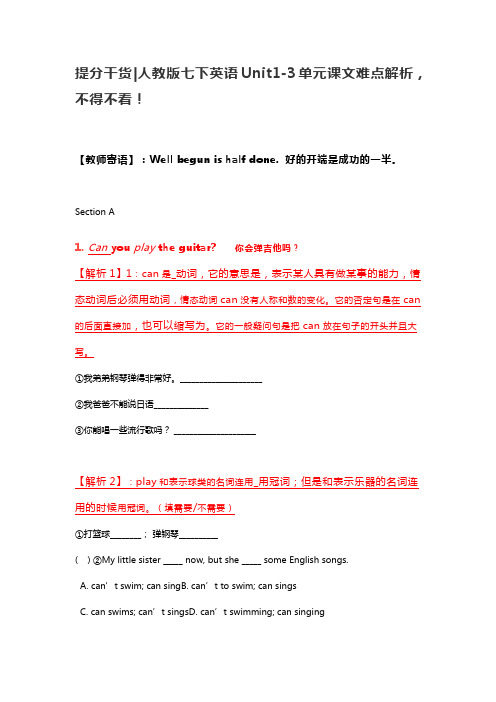
提分干货|人教版七下英语Unit1-3单元课文难点解析,不得不看!【教师寄语】:Well begun is half done. 好的开端是成功的一半。
Section A1.Can you play the guitar?你会弹吉他吗?【解析1】1:can是_动词,它的意思是,表示某人具有做某事的能力,情态动词后必须用动词,情态动词can没有人称和数的变化。
它的否定句是在can 的后面直接加,也可以缩写为。
它的一般疑问句是把can放在句子的开头并且大写。
①我弟弟钢琴弹得非常好。
_____________________②我爸爸不能说日语______________③你能唱一些流行歌吗? _____________________【解析2】:play和表示球类的名词连用_用冠词;但是和表示乐器的名词连用的时候用冠词。
(填需要/不需要)①打篮球________;弹钢琴__________( ) ②My little sister _____ now, but she _____ some English songs.A. can’t swim; can singB. can’t to swim; can singsC. can swims; can’t singsD. can’t swimming; can singing( )③Lily is ______ active girl and she is fond of playing ______ volleyball.A. an; aB. a; theC. an; /D. a; /2.- What club do you want to join? 你想加入什么俱乐部?— I want to join the art club. 我想加入艺术俱乐部【解析1】:句型What+名词+一般疑问句?可以提问人物的身份、姓名、内容、性质和类别,也可以提问事物的目的、价格、数量和效果。
人教新目标七年级下册1-3单元词组总结背诵(可打印)
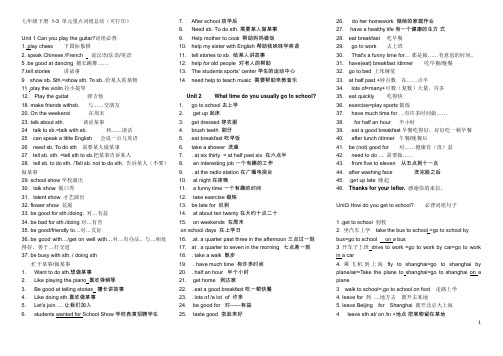
七年级下册1-3 单元重点词组总结(可打印)Unit 1 Can you play the guitar?词组必背1. play chess 下国际象棋2. speak Chinese /French 说汉语/法语/英语5 .be good at dancing 擅长跳舞……7.tell stories 讲故事9 show sb. Sth.=show sth. To sb..给某人看某物11 .play the violin拉小提琴12. Play the guitat 弹吉他18. make friends withsb. 与……交朋友20. On the weekend 在周末23. talk about sth. 谈论某事24 talk to sb.=talk with sb. 和.......谈话25 can speak a little English 会说一点儿英语26 need sb. To do sth 需要某人做某事27 tell sb. sth. =tell sth to sb.把某事告诉某人28. tell sb. to do sth. /Tell sb. not to do sth. 告诉某人(不要)做某事29. school show学校演出30. talk show 脱口秀31. talent show 才艺演出32. flower show 花展33. be good for sth./doing. 对…有益34. be bad for sth./doing对…有害35. be good/friendly to…对…友好36. be good with…/get on well with…对…有办法、与…相处得好、善于…打交道37. be busy with sth. / doing sth.忙于某事/做某事1. Want to do sth.想做某事2. Like playing the piano 喜欢弹钢琴3. Be good at telling stories 擅长讲故事4. Like doing sth.喜欢做某事5. Let’s join .... 让我们加入6. students wanted for School Show学校表演招聘学生7. After school放学后8. Need sb. To do sth. 需要某人做某事9. Help mother to cook 帮助妈妈做饭10. help my sister with English 帮助我妹妹学英语11. tell stories to sb. 给某人讲故事12. help for old people 对老人的帮助13. The students sports’ center学生的运动中心14. need help to teach music 需要帮助来教音乐Unit 2 What time do you usually go to school?1. go to school 去上学2. get up 起床3. get dressed 穿衣服4. brush teeth 刷牙5. eat breakfast 吃早饭6. take a shower 洗澡7. . at six thirty = at half past six 在六点半8. an interesting job 一个有趣的工作9. . at the radio station 在广播电视台10. at night 在夜晚11. a funny time 一个有趣的时间12. take exercise 锻炼13. be late for 迟到14. at about ten twenty 在大约十点二十15. on weekends 在周末on school days 在上学日16. .at. a quarter past three in the afternoon 三点过一刻17. at . a quarter to seven in the morning 七点差一刻18. . take a walk 散步19. . have much time 有许多时间20. . half an hour 半个小时21. get home 到达家22. . eat a good breakfast 吃一顿快餐23. . lots of /a lot of 许多24. be good for 对------有益25. taste good 尝起来好26. do her homework 做她的家庭作业27. have a healthy life 有一个健康的生方式28. eat breakfast 吃早餐29. go to work 去上班30. That's a funny time for…那是做……有意思的时间。
2013新版PEP新目标七年级下册英语unit_1-12单元全册知识点归纳与复习
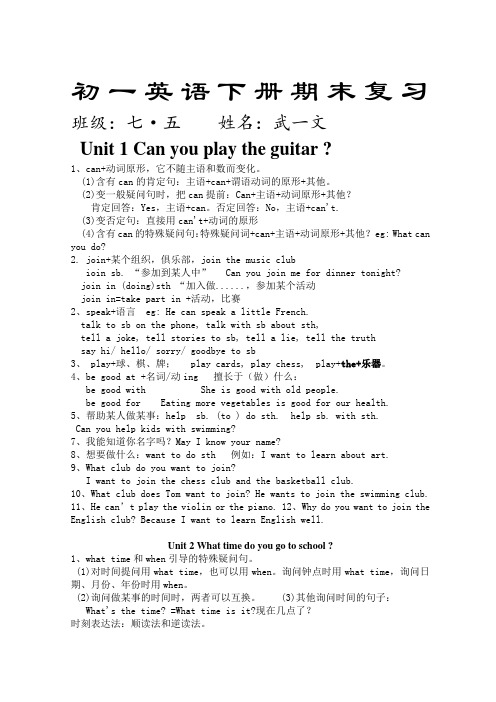
初一英语下册期末复习班级:七·五姓名:武一文Unit 1 Can you play the guitar ?1、can+动词原形,它不随主语和数而变化。
(1)含有can的肯定句:主语+can+谓语动词的原形+其他。
(2)变一般疑问句时,把can提前:Can+主语+动词原形+其他?肯定回答:Yes,主语+can。
否定回答:No,主语+can't.(3)变否定句:直接用can't+动词的原形(4)含有can的特殊疑问句:特殊疑问词+can+主语+动词原形+其他?eg: What can you do?2. join+某个组织,俱乐部,join the music clubioin sb. “参加到某人中” Can you join me for dinner tonight?join in (doing)sth “加入做......,参加某个活动join in=take part in +活动,比赛2、speak+语言 eg: He can speak a little French.talk to sb on the phone, talk with sb about sth,tell a joke, tell stories to sb, tell a lie, tell the truthsay hi/ hello/ sorry/ goodbye to sb3、 play+球、棋、牌; play cards, play chess, play+the+乐器。
4、be good at +名词/动ing 擅长于(做)什么:be good with She is good with old people.be good for Eating more vegetables is good for our health.5、帮助某人做某事:help sb. (to ) do sth. help sb. with sth.Can you help kids with swimming?7、我能知道你名字吗?May I know your name?8、想要做什么:want to do sth 例如:I want to learn about art.9、What club do you want to join?I want to join the chess club and the basketball club.10、What club does Tom want to join? He wants to join the swimming club.11、He can’t play the violin or the piano. 12、Why do you want to join the English club? Because I want to learn English well.Unit 2 What time do you go to school ?1、what time和when引导的特殊疑问句。
2013版新目标七年级下复习课unit1-3

go to school bruth teeth
去上学 刷牙
穿衣服
eat lunch/ have lunch 吃午饭
get dressed
eat quickly
吃得快
go home
have dinner
回家
吃晚饭 do homework 做作业 take a walk 散步 睡觉,早睡 锻炼
clean my room 打扫房间
Revision class
unit 1-3
Unit 1 Can you play the guitar?
Revision(复习)
Expressions(短语)
英语俱乐部--- English club 艺术俱乐部--- art club 象棋俱乐部--- chess club 游泳俱乐部--- swimming club 音乐俱乐部--- music club 弹吉他--- play the guitar 下象棋--- play chess 说英语--- speak English 弹钢琴--- play the piano 拉小提琴--- play the violin
-What club do/does sb want to join? - sb want(wants) to join the chess club. What can sb do? sb can...to join? -We want to join the chess club.
What club do you want to join? Teacher:(1) ___________________________ Mario、Lisa:We want to join the music club. Teacher:(2) __________________________ What can you do ? Mario:I can sing. Teacher:(3)______________________ Can you sing ? Lisa:Yes,I can also play the piano,but I can’t play it very well. Teacher:(4) ____________________________, Mario? Can you play the piano Mario:Yes,l can also play the guitar. Teacher:(5)________________________ Can you play it well ? Mario:Sorry,I can’t play it very well.
新版人教版新目标英语unit1-3(第一、二、三单元)重点语法、句型

Unit 1 My name’s Gina.1.学会介绍人的名字:a.介绍自己:My name is ... .或者:I am ... .意思是:我名叫...;我是...。
(其中name is和I am还可缩写为:name’s和I’m )例句:My name’s Bob.或者:I’m Bob.b.介绍女的:Her name is ... .或者:She is ... . 意思是:她名叫...;她是...。
(其中she is可缩写为:she’s)例句:Her name’s Mary. 或者:She’s Mary.c.介绍男的:His name is ... .或者:He is ... . 意思是:他名叫...;他是...。
(其中he is可缩写为:he’s)例句:His name’s Jack.或者:He’s Jack.▲易考题型:同义句例如:①My name’s Bob.(写同义句)I’m Bob.②Her name’s Mary.(写同义句)She’s Mary.③His name’s Jack.(写同义句)He’s Jack.2.学会询问人的名字:a.问对方的名字:What is your name? 意思是:你叫什么名字?(其中what is可缩写为what’s)例句:----What’s your name? 你叫什么名字?----My name’s Cindy. (或者:I’m Cindy.)我叫辛迪。
b.问女的名字:What’s her name? 意思是:她叫什么名字?例句:----What’s her name? 她叫什么名字?----Her name’s Mary. (或者:She’s Mary.)她叫玛丽。
c.问男的名字:What’s his name? 意思是:他叫什么名字?例句:----What’s his name? 他叫什么名字?----His name’s Jack. (或者:He’s Jack. )他叫杰克。
新目标七年级英语下册Units 1-3知识点归纳
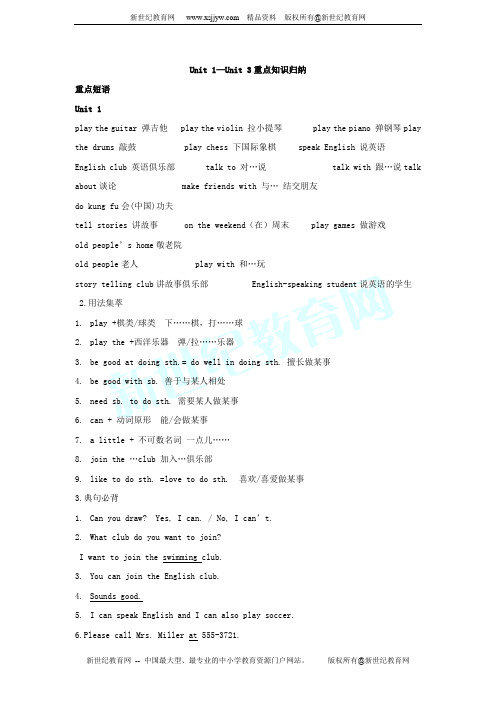
Unit 1—Unit 3重点知识归纳重点短语Unit 1play the guitar 弹吉他 play the violin 拉小提琴 play the piano 弹钢琴play the drums 敲鼓 play chess 下国际象棋 speak English 说英语English club 英语俱乐部 talk to 对…说 talk with 跟…说talk about谈论 make friends with 与… 结交朋友do kung fu会(中国)功夫tell stories 讲故事 on the weekend(在)周末 play games 做游戏old people’s home敬老院old people老人 play with 和…玩story telling club讲故事俱乐部 English-speaking student说英语的学生2.用法集萃1.play +棋类/球类下……棋,打……球2.play the +西洋乐器弹/拉……乐器3.be good at doing sth.= do well in doing sth. 擅长做某事4.be good with sb. 善于与某人相处5.need sb. to do sth. 需要某人做某事6.can + 动词原形能/会做某事7. a little + 不可数名词一点儿……8.join the …club 加入…俱乐部9.like to do sth. =love to do sth. 喜欢/喜爱做某事3.典句必背1.Can you draw? Yes, I can. / No, I can’t.2.What club do you want to join?I want to join the swimming club.3.You can join the English club.4.Sounds good.5.I can speak English and I can also play soccer.6.Please call Mrs. Miller at 555-3721.一.短语荟萃1.speak English /Chinese 讲英语/ 讲汉语2 pay the guitar/the drums/the piano /violin 弹吉他3.play chess/soccer/volleyball 下棋,,踢足球4.join the swimming club 加入游泳俱乐部join the art club 加入艺术俱乐部 join the chess club 加入象棋俱乐部join the music club 加入音乐俱乐部 join a sports club 加入一个运动俱乐部join the story telling club加入讲故事俱乐部5.be good at doing sth. =do well in doing擅长干某事6.tell sb. stories= tell stories to sb. 给某人讲故事, write stories写故事7.talk to sb.与某人说话 talk with sb. 与某人交谈 talk about 谈论…..8.do Chinese Kung fu 表演中国功夫 9.show sb.sth= show sth to sb. 给某人出示事某物10.help sb. with (doing )sth./ ,help sb. (to )do sth.. 帮助某人干某事11.be good with sb. 善待某人 12.need sb to do sth. 需要某人干某事13.English-speaking country 讲英语的国家14.call sb. at….给某人打电话15.the Students’ Sports Center 学生运动中心 16.make friends with sb.与某人交朋友17. at the old people’s home 在老年之家 18.be free 有空 be busy 繁忙重点句型1、I can play soccer, and I can play the guitar.(play +棋类/球类“下…棋,打…球” play the +乐器“弹/拉…乐器”)2.You’re good at telling stories. Are you good with old people?(be good at sth/doing sth.= do well in sth/doing sth. 擅长做某事) (be good with sb/sth. 善于与某人相处/善于处理某事) (be good for对…有好处) 3、Can you dr aw? Yes, I can. / No, I can’t. (can+ do sth / can’t + do sth)4、What club do you want to join? I want to join the chess club.(want sb to do sth想要某人做某事)5、You can join the English club.6、I can speak English and I can also play soccer.7、Are you busy after school?(be busy doing sth忙于做某事)8、We need you to help with sports for English-speaking students.(need sb to do sth需要某人做某事)(help sb to do sth;help sb with sth帮助某人做某事)9、Please call Mrs. Miller at 555-3721. (call sb at + 电话号码)10、I like to draw,too. (like to do sth; like doing sth喜欢做某事)Unit 2what time 几点 go to school 去上学 get up 起床take a shower 洗淋brush teeth 刷牙get dressed 穿上衣服eat breakfast 吃早饭 eat lunch 吃中饭 eat dinner 吃晚饭get to 到达 go to work 去上班play sports做运动 go home 回家do homework 做家庭作业 get home 到家take a walk 散步 go to bed 上床睡觉 clean my room打扫房after that 在那之后 after school放学后 best friend最好的朋友either…or… 要么…要么…(就近原则)lots of=a lot of 许多,大量 radio station 广播电台be/arrive late for 迟到 at night 在晚上 watch TV看电healthy habits健康的习惯 healthy life健康的生活 after dinner晚饭后play computer games玩电脑游戏 half an hour半小时 make breakfast做早餐短语归纳1.what time 几点2.go to school 去上学3.get up 起床4.take a shower 洗淋浴5.brush teeth 刷牙6.get to 到达7.do homework 做家庭作业8.go to work 去上班9.go home 回家 10.eat breakfast 吃早饭11.get dressed 穿上衣服 12.get home 到家13.either…or… 要么…要么…(就近原则) 14.go to bed 上床睡觉15.take a walk 散步16.in the morning/ afternoon/ evening 在上午/下午/晚上17.lots of=a lot of 许多,大量18.radio station 广播电台19.at night 在晚上20.be/arrive late for 迟到用法集萃1.at + 具体时间点在几点(几分)2.eat breakfast/ lunch/dinner吃早饭/午饭/晚饭3.take a(n) +名词从事(……)活动4.half past +基数词……点半5. a quarter to +基数词差一刻到……点6.from …to… 从……到……7.need to do sth 需要做某事典句必背1.What time do you usually get up?I usually get up at six thirty.They usually eat dinner at a quarter to seven in the evening.He usually get up at half past six in the morning.(at+具体时间点“在几点钟”)(at+时钟+分钟“在几点钟”)(half past+时钟(基数词) “…点半” ;a quarter to+时钟(基数词) “差一刻到…点” )(分钟+past+时钟(基数词) “…点过…分”;分钟+to+时钟(基数词) “…点差…分” )2、That’s a funny time for breakfast.3、When do students uasually eat dinner?4、In the evening, I either watch TV or play computer games. (either…or… )5、At twelve,she eats lots of fruit and vegetables for lunch.(lots of+ 可数名词复数/不可数名词“许多,大量…”)6、She knows it’s not good for her, but it tastes good. (be good for)7、Here are your clothes.佳作赏析主题:谈论日常作息习惯写作思路:按照时间顺序记叙一个人的日常作息习惯,必须注意时间的先后顺序,以及时间的表达方式,可以适当运用一些表示频率的副词。
七年级下英语1-3单元知识点大归纳
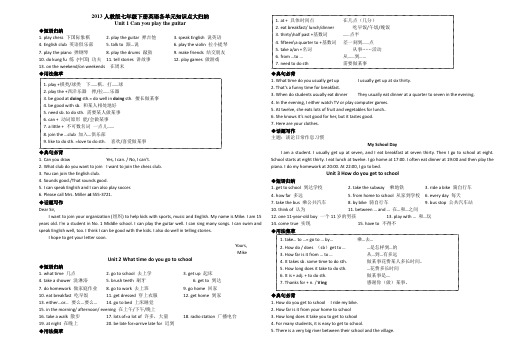
2013人教版七年级下册英语各单元知识点大归纳Unit 1 Can you play the guitar◆短语归纳1. play chess 下国际象棋2. play the guitar 弹吉他3. speak English 说英语4. English club 英语俱乐部5. talk to 跟…说6. play the violin 拉小提琴7. play the piano 弹钢琴8. play the drums 敲鼓9. make friends 结交朋友 10. do kung fu 练 (中国) 功夫 11. tell stories 讲故事 12. play games 做游戏 13. on the weekend/on weekends 在周末 ◆用法集萃◆典句必背1. Can you draw Yes, I can. / No, I can’t.2. What club do you want to join I want to join the chess club.3. You can join the English club.4. Sounds good./That sounds good.5. I can speak English and I can also play soccer.6. Please call Mrs. Miller at 555-3721. ◆话题写作 Dear Sir,I want to join your organization (组织) to help kids with sports, music and English. My name is Mike. I am 15 years old. I’m a student in No. 1 Middle school. I can play the guitar well. I can sing many songs. I can swim and speak English well, too. I think I can be good with the kids. I also do well in telling stories.I hope to get your letter soon.Yours, MikeUnit 2 What time do you go to school◆短语归纳1. what time 几点2. go to school 去上学3. get up 起床4. take a shower 洗淋浴5. brush teeth 刷牙6. get to 到达7. do homework 做家庭作业8. go to work 去上班9. go home 回家 10. eat breakfast 吃早饭 11. get dressed 穿上衣服 12. get home 到家13. either…or… 要么…要么… 14. go to bed 上床睡觉 15. in the morning/ afternoon/ evening 在上午/下午/晚上 16. take a walk 散步 17. lots of=a lot of 许多,大量 18. radio station 广播电台19. at night 在晚上 20. be late for=arrive late for 迟到 ◆用法集萃◆典句必背1. What time do you usually get up I usually get up at six thirty.2. That’s a funny time for breakfast.3. When do students usually eat dinner They usually eat dinner at a quarter to seven in the evening.4. In the evening, I either watch TV or play computer games.5. At twelve, she eats lots of fruit and vegetables for lunch..6. She knows it’s not good for her, but it tas tes good.7. Here are your clothes. ◆话题写作主题:谈论日常作息习惯My School DayI am a student. I usually get up at seven, and I eat breakfast at seven thirty. Then I go to school at eight. School starts at eight thirty. I eat lunch at twelve. I go home at 17:00. I often eat dinner at 19:00 and then play the piano. I do my homework at 20:00. At 22:00, I go to bed.Unit 3 How do you get to school◆短语归纳1. get to school 到达学校2. take the subway 乘地铁3. ride a bike 骑自行车4. how far 多远5. from home to school 从家到学校6. every day 每天7. take the bus 乘公共汽车8. by bike 骑自行车9. bus stop 公共汽车站10. think of 认为 11. between … and … 在…和…之间 12. one 11-year-old boy 一个11岁的男孩 13. play with … 和…玩 14. come true 实现 15. have to 不得不 ◆用法集萃 ◆典句必背1. How do you get to school I ride my bike.2. How far is it from your home to school3. How long does it take you to get to school4. For many students, it is easy to get to school.5. There is a very big river between their school and the village.1. play +棋类/球类 下……棋,打……球2. play the +西洋乐器 弹/拉……乐器3. be good at doing sth.= do well in doing sth. 擅长做某事4. be good with sb. 和某人相处地好5. need sb. to do sth. 需要某人做某事6. can + 动词原形 能/会做某事7. a little + 不可数名词 一点儿……8. join the …club 加入…俱乐部9. like to do sth. =love to do sth. 喜欢/喜爱做某事1. take… to …= go to … by… 乘…去…2. How do / does (sb )get to … …是怎样到…的3. How far is it from … to … 从…到…有多远4. It takes sb. some time to do sth. 做某事花费某人多长时间。
新目标英语七年级(下)Unit_3知识要点归纳

知【重点词汇】train火车subway 地铁ride 骑旅程minute 分钟far &远;远的kilometer千米;公里new 新的;刚出现的drive 开车live 生活;居住stop 车站停止cross 横过;越过afraid 害怕的;畏惧的leave 离开dream 梦想;睡梦true 真的;符合事实的bridge 桥take the subway 乘地铁ride a bike 骑自行车how far 多远how long 多长时间walk to school 步行去上学get to school 到校by bus 乘公汽by bike 骑自行车by train 乘坐火车by boat 乘坐小船cross the river 过河come true 实现;成为现实【重难点句子】1.It takes sb.some time to do sth.花费某人一段时间去做某事例如:It takes me twenty minutes to get to school on foot every morning.我每天早上花20分钟步行到学校。
☆take 还有“乘;坐”之意例如:Shall we go by bus or take a cab?我们是乘公共汽车去还是乘出租去?2.The bus ride is never boring because I always talk to my classmates.坐公交车从不会无聊,因为我总是跟同学们聊天。
在这句话中ride 是名词,表示“行程”。
How 引导的特殊疑问句3.用How do you...?询问别人做某事的方式。
回答可以用by sth.或take sth.的结构。
4.How far 引导的特殊疑问句用来询问两地之间的距离。
34Copyright ©博看网. All Rights Reserved.。
中考英语一轮复习教案 七年级下册Unit 1-3
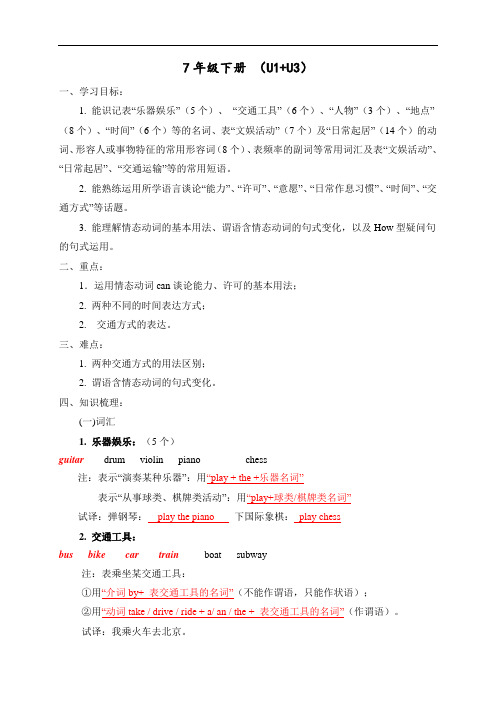
7年级下册(U1+U3)一、学习目标:1. 能识记表“乐器娱乐”(5个)、“交通工具”(6个)、“人物”(3个)、“地点”(8个)、“时间”(6个)等的名词、表“文娱活动”(7个)及“日常起居”(14个)的动词、形容人或事物特征的常用形容词(8个)、表频率的副词等常用词汇及表“文娱活动”、“日常起居”、“交通运输”等的常用短语。
2. 能熟练运用所学语言谈论“能力”、“许可”、“意愿”、“日常作息习惯”、“时间”、“交通方式”等话题。
3. 能理解情态动词的基本用法、谓语含情态动词的句式变化,以及How型疑问句的句式运用。
二、重点:1.运用情态动词can谈论能力、许可的基本用法;2. 两种不同的时间表达方式;2. 交通方式的表达。
三、难点:1. 两种交通方式的用法区别;2. 谓语含情态动词的句式变化。
四、知识梳理:(一)词汇1. 乐器娱乐:(5个)guitar drum violin piano chess注:表示“演奏某种乐器”:用“play + the +乐器名词”表示“从事球类、棋牌类活动”:用“play+球类/棋牌类名词”试译:弹钢琴:play the piano 下国际象棋:play chess2. 交通工具:bus bike car train boat subway注:表乘坐某交通工具:①用“介词by+ 表交通工具的名词”(不能作谓语,只能作状语);②用“动词take / drive / ride + a/ an / the + 表交通工具的名词”(作谓语)。
试译:我乘火车去北京。
I go to Beijing by train. / I take the train to Beijing.3. 动词:文娱活动sing dance draw swim run ride exercise唱歌跳舞画画游泳跑步骑乘锻炼日常起居speak talk tell write show clean teach 说谈话告诉写展示打扫教work live dream leave drive join make 工作住梦想离开驾驶加入使成为taste cross brush品尝横过刷词汇串记:①因为我喜欢唱歌、跳舞、游泳、跑步和锻炼,所以我很健康。
初一英语下册Unit 1-Unit 3知识点总结
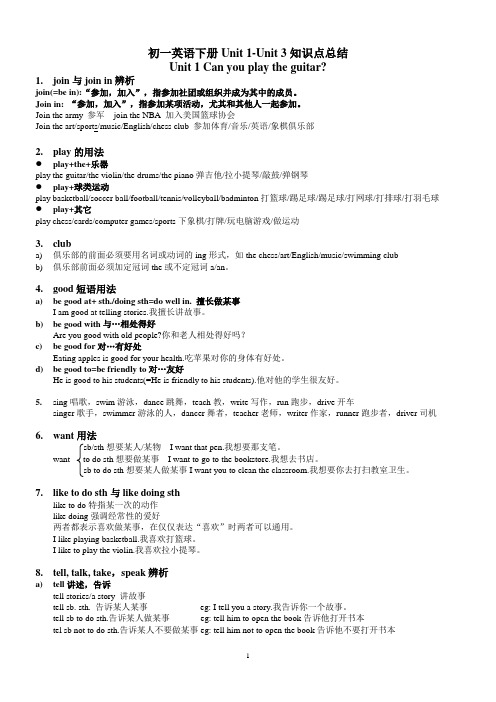
初一英语下册Unit 1-Unit 3知识点总结Unit 1 Can you play the guitar?1.join与join in辨析join(=be in):“参加,加入”,指参加社团或组织并成为其中的成员。
Join in: “参加,加入”,指参加某项活动,尤其和其他人一起参加。
Join the army 参军join the NBA 加入美国篮球协会Join the art/sports/music/English/chess club 参加体育/音乐/英语/象棋俱乐部2.play的用法●play+the+乐器play the guitar/the violin/the drums/the piano弹吉他/拉小提琴/敲鼓/弹钢琴●play+球类运动play basketball/soccer ball/football/tennis/volleyball/badminton打篮球/踢足球/踢足球/打网球/打排球/打羽毛球●play+其它play chess/cards/computer games/sports下象棋/打牌/玩电脑游戏/做运动3.cluba)俱乐部的前面必须要用名词或动词的ing形式,如the chess/art/English/music/swimming clubb)俱乐部前面必须加定冠词the或不定冠词a/an。
4.good短语用法a)be good at+ sth./doing sth=do well in. 擅长做某事I am good at telling stories.我擅长讲故事。
b)be good with与…相处得好Are you good with old people?你和老人相处得好吗?c)be good for对…有好处Eating apples is good for your health.吃苹果对你的身体有好处。
d)be good to=be friendly to对…友好He is good to his students(=He is friendly to his students).他对他的学生很友好。
七年级下册英语unit1 3知识点总结
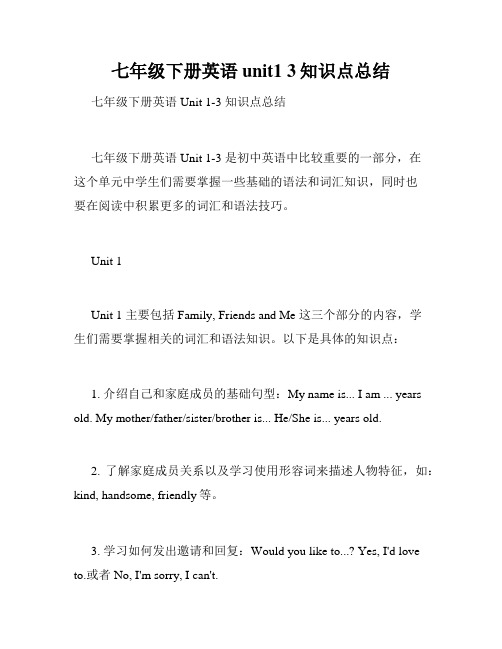
七年级下册英语unit1 3知识点总结七年级下册英语Unit 1-3 知识点总结七年级下册英语Unit 1-3 是初中英语中比较重要的一部分,在这个单元中学生们需要掌握一些基础的语法和词汇知识,同时也要在阅读中积累更多的词汇和语法技巧。
Unit 1Unit 1 主要包括 Family, Friends and Me 这三个部分的内容,学生们需要掌握相关的词汇和语法知识。
以下是具体的知识点:1. 介绍自己和家庭成员的基础句型:My name is... I am ... years old. My mother/father/sister/brother is... He/She is... years old.2. 了解家庭成员关系以及学习使用形容词来描述人物特征,如:kind, handsome, friendly等。
3. 学习如何发出邀请和回复:Would you like to...? Yes, I'd love to.或者 No, I'm sorry, I can't.4. 了解并运用表示年龄、职业、爱好等的英文词汇。
5. 学习关于家庭聚会的词汇,如:food, drinks, games等。
Unit 2Unit 2 的主要内容是学生们需要掌握动词的适当时态和形式,同时加强对英文的听力和口语能力。
以下是具体的知识点:1. 学习动词的时态和形式:现在时、过去时、将来时,以及不规则动词的过去式。
同时进行语句的变换练习。
2. 掌握含时间状语从句的句子结构及用法。
3. 学习如何描述旅行:如何预订机票、酒店,如何问路以及询问如何抵达目的地等相关词汇。
4. 学习寒假和暑假的词汇及表达方式。
5. 加强听力和口语训练,特别是学习如何用英文描写某个地方、描述周围环境等。
Unit 3Unit 3 的主要内容是学习词汇和语法知识。
学生们需要通过阅读和书写来掌握一些实用的英文表达方式。
以下是具体的知识点:1. 掌握名词、形容词和副词的相互转换,如:lively, quiet,noisy等。
新目标七年级下一至三单元知识点

新目标英语七年级下英语1----3单元知识点归纳Unit 11,短语pen pal go to the n\moviesthe United Kingdom a littlethe Uniit States play sportNew Y ork write to sbbe from action moviespeak English tell me about yourselffavorite subject2,语法点总结第三人称单数在一般现在时中的用法当主语为第三人称单数时,实意动词like,want,live,speak 等在一般现在时中的应用1,在一般现在时的陈述句中的应用He likes swimming.She wants to go to the park.My pen pal speaks French.John lives in England.2, 在一般现在时的疑问句的应用。
Dose he like swimming ?Dose she want to go to the park ?Dose your pen pal speak English ?Dose John live in England ?3,在特殊疑问句的应用。
Where dose John live ?What language dose she speak ?What does she like ?Where dose your pen pal come from ?3,单元日常用语总结询问某人来自何处be from 来自………come from 来自……….Where is your pen pal from ? She is from JilinWhere dose your pen pal from ? She comes from Jilin .Unit 21,短语post office on the left / right turn left /right pay phone across from next to welcome to between and in front ofin the neighbood go straight /along/down on sb`s right /left welcome to enjoy doing take a walkhave fun on Center Street take a taxi2,单元语法总结there be 结构1, there be 结构表示某处有某物1,当后面的名词为单数或者不可数名词时,be 动词用is .There is a girl under the tree .There is some water in the bottle .2, 当后面的名词是复数时,be 动词用are .There are seven days in a week .3 当句子中有多个主语名词时,be动词和邻近主语名词保持一致。
2013年七年级英语下册 Unit1-3复习课件 人教新目标版
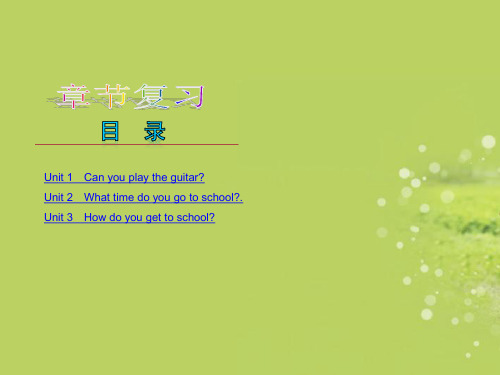
B.She likes teaching and playing games.
C.She likes painting and playing Chinese chess. D.She likes playing chess and do Chinese kung fu.
英语· 新课标(RJ)
Unit 1 ┃ 能力提升训练
Can you tell me an English story?
你能给我讲个英语故事吗? Could you help me with my English? 你能帮我学英语吗? 温馨提示: 上句中的could 是can 的过去式,用在一 般现在时的句子中,表示比can更客气的请求。
Unit 1 ┃ 语法探究
1. Running is good________ a man's health. for
2. Parents aren't always good ________ their children. with
英语·新课标(RJ)
Unit 1 ┃ 易错点针对训练 3. The lady is very good ________ her cat. to 4. If you are not good _________ driving, you'd at better keep the car away.
Do you__8__join the school music club?Please __9__Jack. His__10__is 3455678.
英语·新课标(RJ)
Unit 1 ┃ 能力提升训练 ( B )1.A.on B.in C.of D.to
( B )2.A.runner
新目标英语七年级下第1-12单元知识点讲解

七下1—12单元必背句子与词组Unit1 Where’s your pen pal from? (ok)1. --你的笔友来自哪里(无“实义动词come, 用is/are”)--他来自加拿大。
(有“实义动词come, 用do/does”)练:They’re _______ Australia, a beautiful country.A. come fromB. comes fromC. fromD. for2. --你的笔友来自加拿大吗?(用法同上)--是的。
(用法同上)3. 他来自澳大利亚:He is from Australia. 他是澳大利亚人:4. --你的笔友住在哪里?--他住在多伦多。
-- He/She lives in Toronto.live with sb 与…某人一起生活练:-- When _____ the girl _____ her homework? -- In the evening.A. does, doesB. does, doC. is, doD. is, does-- _______ your sister have a pen pal? Yes, she _______.A. Is, isB. Does, doC. Can, canD. Does, does-- Ling Tao is a Chinese, but now he _______ in the UK.A. liveB. isC. is fromD. comes from5. --你的笔友说什么语言?--他说英语。
-- He/She speaks English.speak+语言;语言;语言;语言;say to sb tell sb sth=tell sth to sb tell sb about sth tell sb to do sth tell sb not to do sth tell a lie/story/joke练:My new pen pal ________ me that he can ________ Chinese but only a little.I can’t ________ French, but I can ________ it in English.6. 我喜欢和我的朋友一起去看电影:①②go to the movies③see a movie7. 写信给某人:互相写信:write e-mails to each other8.9. 告诉我关于你自己:讲故事给某人听:10.11. 相似单词比较:(1) 信:letter 一点:little (2) 法国:France 法语:French12. (1) like v. 喜欢;如:(2) like prep. 像;如:his mother.13. (1) country n. 国家;如:(2) country n. 乡14. (1) from perp. 来自;如:(2) from prep. 从;如:Unit2 Where’s the post office? (ok)1. 问路:(1) Excuse me, how can I get to the post office?(2) Excuse me, can you tell me the way to the post office?2. --这儿附近有一个邮局吗?--是的。
七下英语Unit1-3知识点大全
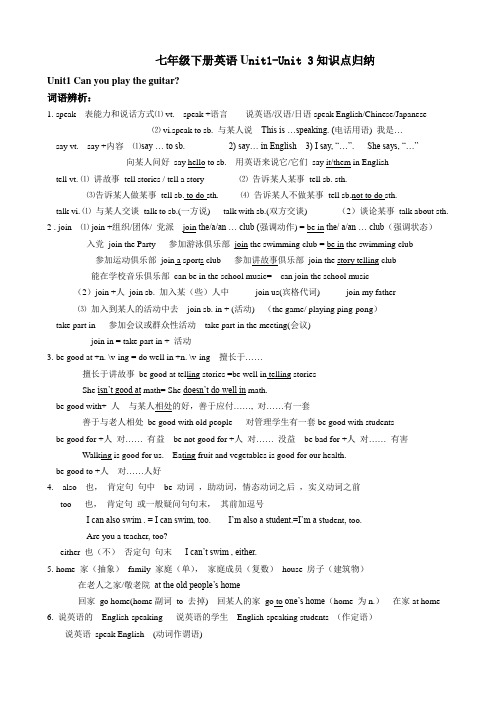
七年级下册英语U nit1-Unit 3知识点归纳Unit1 Can you play the guitar?词语辨析:1. speak 表能力和说话方式⑴ vt. speak +语言说英语/汉语/日语speak English/Chinese/Japanese⑵ vi.speak to sb. 与某人说This is …speaking. (电话用语) 我是…say vt. say +内容⑴say … to sb. 2) say… in English 3) I say, “…”. She says, “…”向某人问好say hello to sb. 用英语来说它/它们say it/them in Englishtell vt. ⑴讲故事tell stories / tell a story ⑵告诉某人某事tell sb. sth.⑶告诉某人做某事tell sb. to do sth. ⑷告诉某人不做某事tell sb.not to do sth.talk vi. ⑴与某人交谈talk to sb.(一方说) talk with sb.(双方交谈) (2)谈论某事talk about sth.2 . join ⑴ join +组织/团体/ 党派join the/a/an … club (强调动作) = be in the/ a/an … club(强调状态)入党join the Party 参加游泳俱乐部join the swimming club = be in the swimming club参加运动俱乐部join a sports club 参加讲故事俱乐部join the story telling club能在学校音乐俱乐部can be in the school music= can join the school music(2)join +人join sb. 加入某(些)人中join us(宾格代词) join my father⑶加入到某人的活动中去join sb. in + (活动) (the game/ playing ping-pong)take part in 参加会议或群众性活动take part in the meeting(会议)join in = take part in + 活动3. be good at +n. \v-ing = do well in +n. \v-ing 擅长于……擅长于讲故事be good at telling stories =be well in telling storiesShe isn’t good at math= She doesn’t do well in math.be good with+ 人与某人相处的好,善于应付……, 对……有一套善于与老人相处be good with old people 对管理学生有一套be good with studentsbe good for +人对…… 有益be not good for +人对…… 没益be bad for +人对…… 有害Walking is good for us. Eating fruit and vegetables is good for our health.be good to +人对……人好4. also 也,肯定句句中be 动词,助动词,情态动词之后,实义动词之前too 也,肯定句或一般疑问句句末,其前加逗号I can also swim . = I can swim, too. I’m also a student.=I’m a st udent, too.Are you a teacher, too?either 也(不)否定句句末I can’t swim , either.5. home 家(抽象)family 家庭(单),家庭成员(复数)house 房子(建筑物)在老人之家/敬老院at the old people’s home回家go home(home副词to 去掉) 回某人的家go to one’s home(home 为n.)在家at home 6. 说英语的English-speaking 说英语的学生English-speaking students (作定语)说英语speak English (动词作谓语)词汇的用法:1.play ⑴play the +乐器弹吉他/弹钢琴/拉小提琴/敲鼓play the guitar/ play the piano/ play the violin/play the drums⑵play + 棋/牌/球类下棋/打牌play chess/play cards踢足球/打篮球/打网球/打排球play soccer/ football/ play basketball/ play tennis/play volleyball⑶与某人玩play with sb. (宾代) 与人玩游戏play games with people玩某物play with sth. 玩水play with water做运动play sports=do/have sports= take exercise 玩电脑游戏play computer games2. sport 作定语常用复数 a sports club sports shoes/trousers/clothes指一项运动用单数Running is a good sport.3. want vt. ⑴ want +n.\to do 1) want sth. 2) want to do 3) want sb. (宾代) to do动词、介词后用宾格代词(me/us/you/you/it/ him/her/them)(2)want …for … 为…… 想要……⑶wanted “被需要的”常用在招聘或启示的标语中招聘教师teachers wanted (作后置定语)want students for school show= students wanted for school show 为学校演出招募学生4.show ⑴ n. 演出,节目,表演,展示学校演出the school show 电视节目TV show 脱口秀talk show 时装表演fashion show 在展览中be on show注意:表演中国功夫do Chinese kung fu⑵ v. 展示,给……看show sb. 给我们展示show us把某物拿给某人看show sb sth. =show sth. to sb. 当看的物为代词时,只能用show it/ them to sb.5. teach 三单teaches v. 教teacher n. 教师⑴ teach sb./sth. teach us/me teach math⑵ teach sb. sth. sb.为宾格代词教我们的英语teach us English⑶ teach sb. to do sth. 教他们游泳teach them to swim6. help v. 帮助⑴ help sb. ⑵ help with sth./v-ing ⑶ help sb. with sth.= help sb. (to) do sth.help me with math=help me learn math=help me to learn mathn. (不可数名词)帮助⑴ some/much help ⑵with one’s help = with the help of 在某人的帮助下⑶ ask sb. for help向某人寻求帮助注意:help yourself to … (some fish.) 随便吃……鱼7. need 实义动词三单needs 有人称和数的变化问句和否定句借助do/does 可单独作谓语⑴ need(s) sth. ⑵ need(s) to do ⑶ need(s) sb/sth. to do情态动词没有人称和数的变化(常用在问句和否定句中)问句need 提前否定句need +not =needn’t 不能单独作谓语need(原形) + v(原形)She need come. (一般)Need she come tomorrow? No, you needn’t8. write ⑴写小说write stories /write a story ⑵写信write a letter⑶给某人写信write to sb.=write a letter to sb.9. or 或者,还是⑴选择疑问句回答不用yes/no 从中选一个来回答or 前读↗,or 后读↘选择疑问句前半部分可以是一般疑问句,也可以是特殊疑问句。
七年级英语下册Unit1—3知识总结
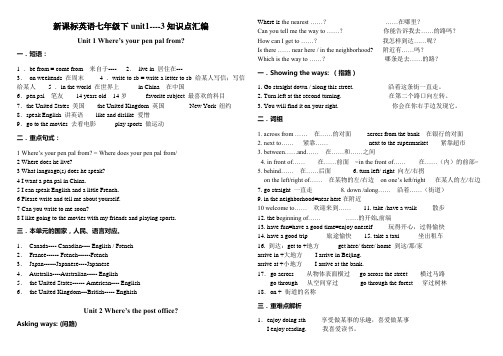
新课标英语七年级下unit1----3知识点汇编Unit 1 Where’s your pen pal from?一.短语:1 .be from = come from 来自于---- 2.live in 居住在---3.on weekends 在周末 4 .write to sb = write a letter to sb 给某人写信;写信给某人 5 .in the world 在世界上in China 在中国6.pen pal 笔友14 years old 14岁favorite subject 最喜欢的科目7.the United States 美国the United Kingdom 英国New York 纽约8.speak English 讲英语like and dislike 爱憎9.go to the movies 去看电影play sports 做运动二.重点句式:1 Where’s your pen pal from? = Where does your pen pal from/2 Where does he live?3 What language(s) does he speak?4 I want a pen pal in China.5 I can speak English and a little French.6 Please write and tell me about yourself.7 Can you write to me soon?8 I like going to the movies with my friends and playing sports.三.本单元的国家,人民、语言对应。
1.Canada---- Canadian---- English / French2.France------ French------French3.Japan------Japanese----Japanese4.Australia----Australian----- English5.the United States------ American---- English6.the United Kingdom---British----- EnghishUnit 2 Where’s the post office?Asking ways: (问路)Where is the nearest ……?……在哪里?Can you tell me the way to ……?你能告诉我去……的路吗?How can I get to ……?我怎样到达……呢?Is there …… near here / in the neighborhood? 附近有……吗?Which is the way to ……?哪条是去……的路?一.Showing the ways: (指路)1. Go straight down / along this street. 沿着这条街一直走。
新目标七年级英语下册1-3单元知识点汇总
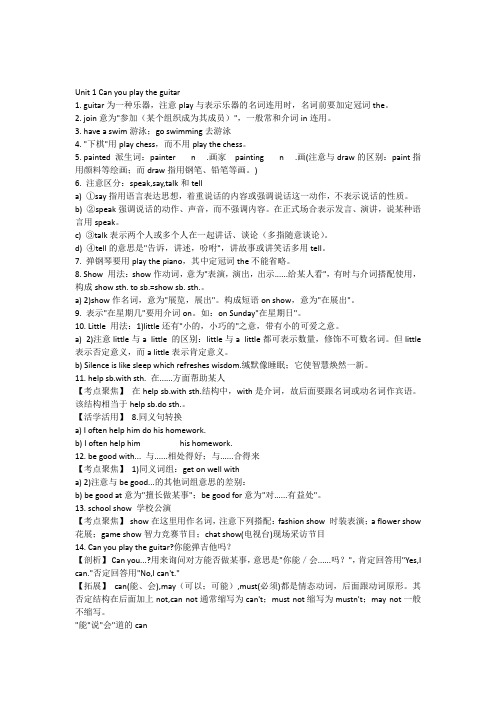
Unit 1 Can you play the guitar1. guitar为一种乐器,注意play与表示乐器的名词连用时,名词前要加定冠词the。
2. join意为"参加(某个组织成为其成员)",一般常和介词in连用。
3. have a swim游泳;go swimming去游泳4. "下棋"用play chess,而不用play the chess。
5. painted 派生词:painter n .画家painting n .画(注意与draw的区别:paint指用颜料等绘画;而draw指用钢笔、铅笔等画。
)6. 注意区分:speak,say,talk和tella) ①say指用语言表达思想,着重说话的内容或强调说话这一动作,不表示说话的性质。
b) ②speak强调说话的动作、声音,而不强调内容。
在正式场合表示发言、演讲,说某种语言用speak。
c) ③talk表示两个人或多个人在一起讲话、谈论(多指随意谈论)。
d) ④tell的意思是"告诉,讲述,吩咐",讲故事或讲笑话多用tell。
7. 弹钢琴要用play the piano,其中定冠词the不能省略。
8. Show 用法:show作动词,意为"表演,演出,出示......给某人看",有时与介词搭配使用,构成show sth. to sb.=show sb. sth.。
a) 2)show作名词,意为"展览,展出"。
构成短语on show,意为"在展出"。
9. 表示"在星期几"要用介词on。
如:on Sunday"在星期日"。
10. Little 用法:1)little还有"小的,小巧的"之意,带有小的可爱之意。
a) 2)注意little与a little 的区别:little与a little都可表示数量,修饰不可数名词。
新目标英语七年级下册1-3单元知识点集锦

新⽬标英语七年级下册1-3单元知识点集锦七年级下学期各单元知识点集锦Unit 1 . Where’s your pen pal from?Part 1 Phrases1. pen pal = penfriend 笔友2. the United States = the U.S.A. =America 美国3. the United Kingdom = the U.K. 英国4. practice the conversation 练习这个对话5. live in….. 住在某地6. look at….. 看…/have a look(at…….) 看⼀看(….)7. the name of………..的名字8. in these countries 在这些国家9. what language(s) 什么语⾔10. have brothers and/or sisters 有兄弟和/或姐妹11. one’s (形容词性物主代词或名词所有格) favorite subject ….最喜欢的学科12. the answer(s) to the question(s) 这道(些)问题的答案13. want a pen pal in +地点想要⼀个…..的笔友14. go to the movies with sb. 和….⼀起去看电影15. play sports 做运动16. write to sb. (soon) / write a letter to sb. (快点⼉)给某⼈写信17. tell sb. about yourself 告诉某⼈关于你⾃⼰的事tell sb. about sth. 告诉某⼈关于…..的事18. one’s likes and dislikes ….的好恶Part 2. Sentences and Structures1.be from sw.come from sw. 某⼈来⾃某地.2.How about you ? 你呢?→What/How about+名词(短语) / 动名词(短语) / 宾格⼈称代词? …..怎么样?3.I think + 宾语从句.4. Where do/does sb. live? …. live/lives in sw.Which city do /does sb. live in ?4.What language(s)do /does sb. speak? ….说什么语⾔?→…..speak /speaks + 语⾔. ….说……(语⾔)。
七年级 新目标下册Unit 1-3复习课件

4. can't 表示__________ 否定猜测 。如: —Is that Mr. Smith?
那是史密斯先生吗?
—That can't be him. He is in New York now.
那不可能是他。他现在在纽约呢。
英语·新课标(RJ)
Unit 1 ┃ 语法探究 B. 句型变化 肯定句: He can play the_drums. 否定句: He _________play the drums. can't
许可 。如: 2. 表示__________ You can play the violin after school every day. 每天下课后你可以拉小提琴。
英语·新课标(RJ)
Unit 1 ┃ 语法ቤተ መጻሕፍቲ ባይዱ究
Students can‵t take cell phones or Mp3 players to school.学生不允许带手机或MP3到学校。 3. 表示__________ 。如: 请求
一般疑问句:
_________he _________the drums? Can play 两种回答: Yes, he _________ . /No, he _________ can can't . 对画线部分提问:
________ play? What ________he can
Unit 1 ┃ 能力提升训练
Can you tell me an English story?
你能给我讲个英语故事吗? Could you help me with my English? 你能帮我学英语吗? 温馨提示: 上句中的could 是can 的过去式,用在一 般现在时的句子中,表示比can更客气的请求。
- 1、下载文档前请自行甄别文档内容的完整性,平台不提供额外的编辑、内容补充、找答案等附加服务。
- 2、"仅部分预览"的文档,不可在线预览部分如存在完整性等问题,可反馈申请退款(可完整预览的文档不适用该条件!)。
- 3、如文档侵犯您的权益,请联系客服反馈,我们会尽快为您处理(人工客服工作时间:9:00-18:30)。
Unit 1-3知识点复习Unit 1 Can you play the guitar?一、重点词汇1.词形变化:(1)sing (v.)唱歌—_______ (n.)歌手(2)dance(v.)跳舞—_______ (n.)舞蹈家(3)teach(v.)教—_______ (n.)教师(4)swim(v.)游泳—_______ (n.)游泳者(5)speak(v.)说—______ (n.)说话者;演讲者(6)write(v.)写—_______ (n.)作家(7)play (v.)玩—_______ (n.)运动员;播放器(8)story (n.) 故事;小说—_______(复数)(9)people(n.) —_______(集体名称、单复数同形)人;人们—_______(复数)民族(10)g ood (adj.) —_______(adv.) “好”(11)m usic (n.)音乐—________(n.)音乐家________(adj.)音乐的(12)l et’s = _______ can’t = ______(13)c enter = _______ 中央;中心(14)w eekend = ____________________周末(15)o n weekends = _________ 在周末(16)b e good at = ________擅长做某事(17)t oo(肯句末,逗隔开)= _____ (肯句中,be、情、助动后,实动前)/ ______(否句末,逗隔开)“也”(18)f ree adj.—_______ adj.(反义词)(19)e asy adj. —_______ adj.(反义词)=________(同义词)(20)join sb. = _________ = __________(同义词)加入某人(使其成为其中一员)(21)b e good with sb, =_______和某人相处得好(22)w ant = _______ “想要”(23)W hat about you? = ______________?(同义句)2.重点单词:(1)名词(n.)乐器名称:钢琴_______ 小提琴_______ 吉他_______ 鼓_______球类名称:足球_______ 篮球_______ 网球_______ 棒球_______乒乓球_______ 排球_______ 羽毛球_______ 高尔夫球_______语言:汉语_______英语_______日语_______法语_______其他:象棋_______俱乐部_______ 故事;小说_______ (中国)功夫______ 人(们)______家______ 中心;中央_______ 周末_______ 音乐家_______ (2)动词(v.)唱歌_______ 跳舞_______ 画画_______ 讲诉;告诉_______写作;写字_______ 参加;加入_______ 游泳_______ 说话_______展示;给……看_______ 说话;交谈_______ 制造_______ 教;讲授_______ (3)副词(adv.)也;而且_______ 今天_______(4)连词(conj.)或者;也不(用于否定句)_______3.易错知识点(1)good与well的区别运用;(2)be good with与be good at/be good for/ begood to的区别运用;(3)tell, say, speak, talk的区别运用;(4)join与join in的区别运用;①. join v. 参加,加入它是短暂性动词,不能和一段时间连用。
后加组织名称或人称代词join the army /Party/ football team 参军/入党/加入足球队②.join in 参加,加入某种活动。
May I join in your conversation? 我可以加入你们的谈话吗?(5)too, also与either的区别运用;(6)play与乐器名称及球类名称连用冠词的用法;(7)help的用法;(8)like的用法;;(9)want的用法。
二、重点短语(1)下国际象棋__________ (2)敲鼓__________(3)弹钢琴__________ (4)拉小提琴__________(5)弹吉他__________(6)讲英语/汉语/日语/法语__________(7)跟说;和交谈__________(8)在周末__________(9)学校音乐节(10)打中国功夫__________(11)讲故事__________(12)结交朋友__________(13)在某方面帮助(某人)__________ (14)英语俱乐部__________(15)游泳俱乐部__________(16)艺术俱乐部__________(17)音乐俱乐部__________(18)体育俱乐部__________(19)象棋俱乐部__________(20)善于应付……的;对……有办法;与……相处融洽__________(21)对……有好处__________(22)擅长于__________(23)对……友好__________(24)什么俱乐部__________(25)什么体育活动__________(26)想要做某事__________(27)加入音乐俱乐部__________(28)你呢?__________(29)喜欢做某事__________ (30)学校公演__________(31)招募学生__________(32)在音乐教室__________(33)展示某人某物__________(34)打篮球/网球/排球/棒球/乒乓球/踢足球__________(35)在学校音乐俱乐部__________ (36)唱歌和跳舞__________(37)年轻人/老年人__________(38)在某方面帮助某人__________ (39)在养老院__________(40)有空/忙碌__________(41)在七月__________(42)和某人一起玩游戏__________ (43)拨打某一号码找某人__________ (44)讲英语的学生/国家__________ (45)学生体育活动中心__________ (46)有时间__________(47)需要(某人)做某事__________ (48)教音乐__________(49)教某人(做)某事__________ (50)做的好_________(51)放学后___________三、重点句型I.句型结构:1.含情态动词can的各种句式:陈述句:Sb. can/can’t do sth.一般疑问句:Can sb. do sth? Yes, sb. can. / No, sb. can’t.特殊疑问句:What can sb. do?2.—What club do/does sb. want to join?—Sb. want/wants to join the English/ music…. club.3.—What sports can sb. play?—Sb. can play soccer/volleyball/basketball/tennis/ping-pong/baseball. II.必背句子1.I want to join the art club.2.—Can you swim?—Yes, I can./ No, I can’t.3.—What club do you want to join?—I want to join the chess club. 4.—What sports can you play? —Soccer.5.—What can you do?—I can dance.6.You speak English very well.7.Please talk to Mr. Zhang after school.e and show us!9.I can speak English and I can also playsoccer.10.I like to talk and play games with people.11.I’m in the school music club. I can playthe guitar and the piano. I can sing and dance, too.12.Then we need you to help with sports forEnglish-speaking students.13.Call Mr. Brown at 293-7742.14.Are you good with old people?15.Can you play the piano or the violin?16.The school needs help to teach music.17.Then you can be in our school musicfestival.四、重点语法情态动词can的基本用法can作情态动词,表示一种能力,意思是“能;会”,后跟动词原形,一起构成谓语。
如:She can drive, but she can’t ride a bicycle.【拓展】(1)含有情态动词can的肯定句,变一般疑问句时需要把can提到主语之前;否定句是在can后加not。
含有can的一般疑问句的肯定回答为:Yes, 主语(人称代词主格)+ can;否定回答为:No, 主语(人称代词主格)+ can’t。
如:—Can you sing the song in English?—No, I can’t. I can’t sing the song in English.(2)can还可以表示“许可;允许”,意思是“可以(做)……如:—Can I use your pen? —Yes, you can.(3)can表示请求,用于Can you…?句型中,意为“你能不能……/你可以……吗?”。
如:Can you lend me your bike?(4)can表示提建议,常用于句型Can I ….?意为“我来(做)……好吗?”如:Can I get you something to eat?五、单元话题作文1.My hobby 《我的爱好》2.Teachers Wanted 招聘启示六、巩固提升I.根据句意及首字母或汉语提示完成单词。
